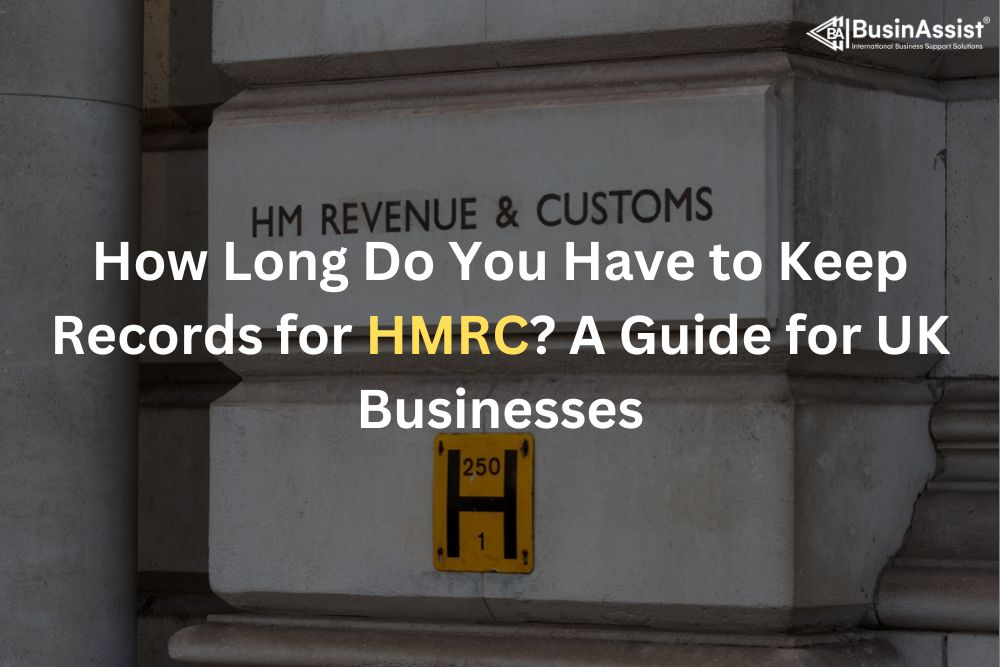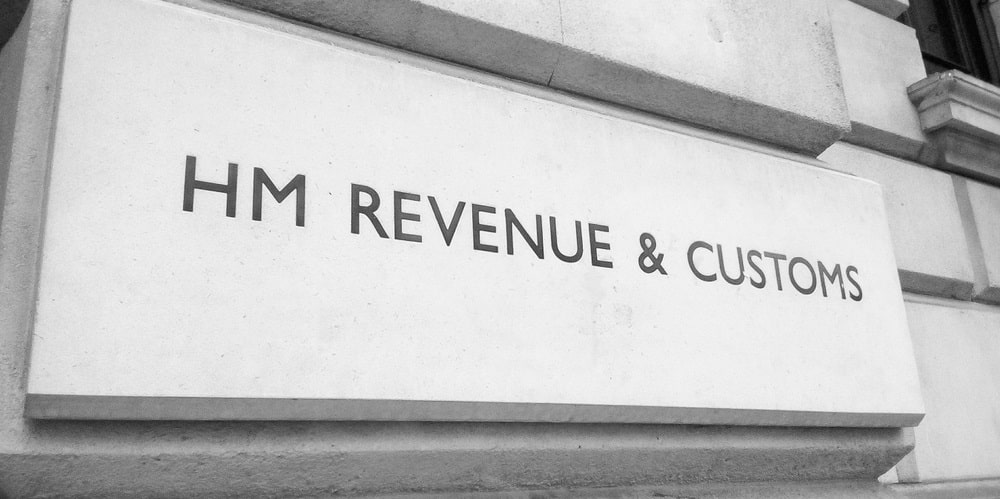Last Updated on December 17, 2025 by Joy Kyalo

Business owners or directors should understand that keeping business and accounting records is crucial when starting a company. Some of the important documents businesses should keep are their tax records. Without them, you might find yourself struggling to be compliant, which might cause your business to incur penalties.
How long do you have to keep records for HMRC? Retaining records depends on your business structure whether you have an incorporated UK limited company or a sole trader. This article will highlight how long you can retain records for Her Majesty’s Revenue and Customs (HMRC), why you have to keep the records, and how each structure should go about keeping business records.
Key Takeaways
-
- HMRC generally requires businesses to keep records for at least 5-6 years, though some, like statutory registers, must be retained for the company’s lifetime.
- Record-keeping rules vary: tax, VAT, payroll, and meeting records each have different retention periods.
- Keeping complete, accurate records ensures compliance, avoids penalties, and supports smooth tax and business management.
What important records should a sole trader keep?
There are records you should keep as a sole trader. As a sole trader, you are in charge of paying your own taxes through self-assessment. So, the records that you should retain for HMRC should show your personal and business income and business expenses.
What records should I keep for HMRC as a sole trader? As a sole trader, you should keep;
- Records for all your personal income
- Records for your business income
- Sale records
- VAT records
- Records of purchase and sale of business assets
- Receipts
- Record of stocks
- PAYE and National Insurance records (if you have employees)
- Records of business equipment
- Bank statements.
Which important records should a UK limited company keep?
As a limited company in the UK, there are important records you should keep to comply with tax and UK company laws. The important records include;
Incorporation documents: These include a Certificate of Incorporation, Memorandum of Association, and Article of Association. Other company information a UK limited company should keep include;
- Minutes of board meetings and resolutions
- Details of directors, shareholders, and company secretaries
- The results of any shareholder votes and resolutions
- Registration of share allocations and transfers with Companies House
- An index of the names of the company’s members, if the company has more than 50 members
Accounting records: All money received and spent, including grants and payments from COVID-19 support schemes:
- Details of assets owned by the company
- Debts the company owes or is owed
- The assets in stock that the company owns at the end of the fiscal year
- The stock takings used to work out the stock figure
- A detailed record of all items purchased and sold, including details of the sellers and buyers involved
- Financial documents such as bank statements, receipts, petty cash records, purchase orders, and delivery notes
- Invoices, contracts, sales books, and till rolls
Statutory company register: Register of members (shareholders or guarantors)
- Register of directors
- Register of directors’ usual residential addresses
- Register of secretaries
- Register of people with significant control (PSC register)
- A record of charges along with a duplicate of each document, such as a loan agreement or mortgage deed, that establishes a charge
- Register of debenture holders
PAYE records: Payments made to employees
- Deductions from employees’ wages for National Insurance Contributions (NICs), Income Tax, and Student Loan payments
- Details of employee benefits and expenses
- All records of statutory payments
Why should businesses keep records for HMRC?
Compliance with UK company and tax laws
- Makes it easier for tax preparation and payments
- Helps business owner to avoid under/over tax payments
- Eases the process of distributing profits to shareholders through dividends and ensures equitable sharing of profits and losses in partnerships
- Helps in maximising the expenses you can claim, which in turn reduces your tax obligations
- Offers assistance if you are subjected to an investigation by HMRC
- Speeds up the preparation of your accounts at the end of the fiscal year
- Supplies you with necessary information needed for managing and growing your business effectively
- Assists in navigating changes and improvements within your enterprise
- Aids in planning to meet financial commitments, such as paying creditors or employees
- Makes it simpler to secure loans or sell your business
- Avoids over/under tax payments
Where should company records be kept?
When companies are being incorporated in the UK, business owners have to present a registered office address to Companies House. The address is used to register the company and for the official correspondence. The address should be in the same jurisdiction as the company making it the best place to keep your company records unless a company chooses to keep their records on a Single Alternative Inspection Location (SAIL) address.
Companies House assumes that all company records are kept in a registered office address since it is the one on their records. Unless otherwise, companies must notify Companies House they are keeping some records at a SAIL address and must specify the record kept there. The SAIL address must be in the same country as the registered office.
For sole traders, they can use bookkeeping software or use an accountant. To cut down on expenses, bookkeeping software is more affordable than hiring an accountant. The software can be used to store records of your expenses, and invoices, and has other features that can streamline a self-employed individual accounting process.
How long should you keep your records for HMRC?

If you’re self-employed, HMRC recommends that you keep your records for six years after your last 31st of January tax return deadline. For example, if you filed your tax return for the year 2023/24 on January 31, 2025, it is important to retain your tax documents and other significant records until at least January 2031.
However, if you submit your return extremely late, such as four years after the deadline, you MUST keep your records for at least 15 months after you’ve filed that tax return.
According to legal requirements, the duration for which company records must be retained varies based on the specific type of record. Statutory company registers are required to be maintained for the entire lifespan of the company, however, upcoming changes will affect the regulations regarding which registers must be preserved.
Pro Tip: Keep Your HMRC Records Longer for Extra Protection
To stay fully compliant, always keep your HMRC records for at least 6 years, and consider holding them longer in case of late returns, investigations, or future financial checks. Having complete records on hand can protect you from penalties and make business management much easier.
Minutes of meetings and company resolutions must be kept for at least 10 years from the date of the resolution or meeting to which they relate.
It is generally required that accounting and financial records be maintained for a minimum of 6 years following the conclusion of the relevant financial year or accounting period.
For VAT registration, all associated records must be retained for at least six years from their creation date, or for ten years if the VAT One Stop Shop scheme is utilised.
Additionally, employment records should be retained for no less than three years after the end of the applicable tax year.
Records to prove that you are paying the minimum wage must be kept for at least 6 years from the last day of the pay reference period after the one those records cover.
Construction Industry Schemes are required to be maintained for a minimum duration of three years following the conclusion of the relevant tax year.
So how long do you have to keep records for HMRC? The retention period for company records differs depending on the type of record in question. However, HMRC recommends records be kept for at least five years from the end of the tax year to which the records relate.
BusinAssist helps businesses with their statutory records when incorporating a UK limited company. Once your company is approved by Companies House, we send you your company incorporation details such as Certificate of Incorporation, Memorandum of Association, and Articles of Association.
During the incorporation, your company will be registered for Corporation tax to comply with HMRC tax laws. We also help with ongoing company services such as filing your Confirmation Statements and Annual Accounts.
For more information, contact us at info@businassist.com.
FAQs
Q: Do I need to keep paper records for HMRC?
Ans: No, there are no rules by HMRC to keep paper records. As long as your records are accurate, readable, and complete, you can choose to either keep them on paper, digitally or use a software program.
Q: How long do HMRC keep income tax records?
Ans: HMRC recommends companies/ businesses/ individuals to keep their records for at least 5 years from the end of the tax year to which the records relate. For example, records for tax year 5th January 2024 should be kept until 5th January 2029.
Q: How to check my HMRC records?
Ans: To check your HMRC records, you need to have an HMRC online account. If you have an account, you will;
- Login to your account with your credentials
- Once logged in, navigate to the records that you want to access i.e. National Insurance, income tax, and Self-Assessment.
- Review your records and contact HMRC if need be
Q: What are the statutory records of HMRC?
Ans: Statutory records consist of the documents required by relevant tax laws for individuals or businesses to maintain. These records are important for individuals and businesses to prepare and submit allowing HMRC to verify them.
Q: How do I check my National Insurance record HMRC?
Ans: To check your National Insurance record, you should;
- Visit the HMRC website
- Login into your personal tax account using the Government Gateway user ID. (if you don’t have an account, you can create one using your Government Gateway user ID)
- Once logged in, access your National Insurance record. You will be able to view what you have paid, any National Insurance credit you have received, if you will benefit from paying a voluntary contribution, and how much it will cost you if you can pay a voluntary contribution.
Read Also:
- Registered Office Address Service London, UK: For Your Business Needs
- Can HMRC Access Your Bank Account? What Every Taxpayer Should Know
- Understanding the Certificate of Good Standing for UK Companies: What It Is and Why It Matters!
- How to Change Your SIC Code on Companies House: A Step-by-Step Guide for UK Businesses
- Understanding HMRC Errors and Mistakes Guidance: Your Rights and Responsibilities
- Lost Your Government Gateway User ID and Password? Here’s How to Find Them
- How to Fill Out a Stock Transfer Form J30: A Step-by-Step Guide
- When Do I Need to Register My Business with HMRC? A Guide for New Entrepreneurs

The BusinAssist Editorial Team has 15+ years of experience writing about small business and company formation in the UK, Canada, and the USA. We simplify complex processes and provide practical insights to help entrepreneurs succeed. Business Assist with BusinAssist – your partner for business success.

